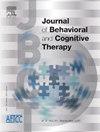社会心态量表的初步开发与初步研究
IF 1.6
Q3 PSYCHIATRY
引用次数: 0
摘要
社会心态量表(SMS)的开发是为了评估与人类互动的进化观点相关的六种动机系统。短信有75个条目,可能被视为一种冗长的工具,具有诸如耗时、响应疲劳和/或数据质量下降等限制。为了解决这些问题,本研究在一个社区样本中描述了社会心态量表-简要表格(BF-SMS)的发展。方法将总样本(N = 471, M = 35.6, SD = 15.5)分为2个子样本(N = 236和N = 235),分别采用探索性因素分析(EFA)和验证性因素分析(CFA)。结果fa建议六因素解决方案(X2 = 10820.397, df = 2775, p <;0.001),最终的CFA表明模型拟合足够(CFI = 0.99, TLI = 0.98, RMSEA = 0.053,[。][044, 0.061], p <;0.001)。最终形成的短信- bf量表有26个条目,所有的分量表都与短信分量表呈正相关。结论短信- bf可以作为短信的一种替代方式,取代长格式的局限性。进一步的研究可以解决其他样本的收敛效度、发散效度和判别效度。本文章由计算机程序翻译,如有差异,请以英文原文为准。
Initial development and preliminary study of the social mentalities scale − Brief form
Introduction
The Social Mentalities Scale (SMS) was developed to assess six motivational systems associated with the evolutionary perspective of human interactions. With 75 items SMS may be viewed as a long instrument with limitations such as time consumption, response fatigue and/or declining data quality. To address these issues, this study describes the development of the Social Mentalities Scale − Brief Form (BF-SMS) in a community sample.
Methods
The total sample (N = 471, M = 35.6, SD = 15.5), was divided in two subsamples (n = 236 and n = 235) where Exploratory Factor Analysis (EFA) and a Confirmatory Factor Analysis (CFA) were used.
Results
EFA suggested a six-factor solution (X2 = 10820.397, df = 2775, p < 0.001), and the final CFA suggested an adequate model fit (CFI = 0.99, TLI = 0.98, RMSEA = 0.053, [.044, 0.061], p < 0.001). The final form SMS-BF remained with 26 items and all subscales correlated positively with SMS subscales.
Conclusions
The SMS-BF may be an alternative for the SMS supplanting the identified limitations of the long forms. Further studies may address convergent, divergent and discriminant validities in other samples.
求助全文
通过发布文献求助,成功后即可免费获取论文全文。
去求助
来源期刊

Journal of Behavioral and Cognitive Therapy
Psychology-Clinical Psychology
CiteScore
3.30
自引率
0.00%
发文量
38
审稿时长
60 days
 求助内容:
求助内容: 应助结果提醒方式:
应助结果提醒方式:


